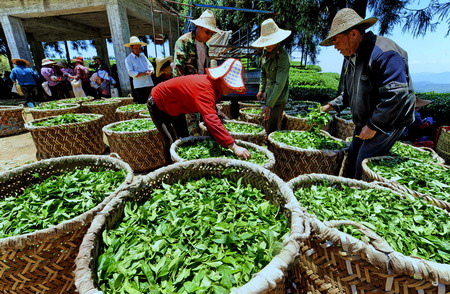Economy
Deal to benefit island farmers
By Xin Dingding and Cheng Yingqi (China Daily)
Updated: 2010-06-30 11:57
 |
Large Medium Small |
|
 |
|
Farmers collect tea at a Taiwan-invested farm in Minhou county, Fujian province. [Zhang Guojun / Xinhua] |
BEIJING - Taiwan farmers are expected to benefit after the mainland's approval of tariff-free imports of 18 Taiwan-grown agricultural and aquatic products, in a long-awaited ECFA signed on Tuesday.
The 18 items include tea, orchids, fish and a few fruits, in addition to a list of 34 farm products that already can be shipped to the mainland with no tariffs.
To protect Taiwanese farmers, agricultural products from the mainland will not be included in the ECFA's tariff cut list.
J. L. Ou, a senior officer with the Taiwan Provincial Farmers' Association, told China Daily on the phone that the agreement will "be helpful" for Taiwan-grown farm products to explore the mainland market in the short run.
Previously, the mainland collected a 10 to 20 percent tariff on the 18 agricultural and aquatic products, according to the appendix of ECFA.
With the tariff cut, Taiwan farmers can lower their costs and nudge into the mainland market.
Taiwan media quoted Lee Tsangyu, president of the Taiwan Orchid Growers Association, as saying that ECFA will make the mainland their new market in addition to Japan, which imports 90 percent of Taiwan-grown orchids.
On the flip side, however, Ou worried about the long-term prospect.
"Free trade can work because it benefits both sides. But now only one side benefits," he said.
"Many farmers are not sure how long the benefit will last and when the mainland products will be granted the same tariff cut."
But experts believe that Taiwan needs to sign ECFA with the mainland to avoid being isolated in the area.
Qiu Huanguang, an associate researcher with the Center for Chinese Agriculture Policy under the Chinese Academy of Sciences, said that from this November, at least 7,000 products imported from 10 members of the ASEAN (Association of Southeast Asian Nations), including most agricultural products, will enter China tariff free.
"If Taiwan does not sign ECFA, it will see its competitiveness reduced because ASEAN products pour in without tariff. Taiwan's fruits and aquatic products share similarities with Southeast Asian countries," he said.
Analysts expected not much impact on mainland farmers except for some tea growers.
Shi Liang, an analyst with the CITIC Securities Co, said that the tariff preference for the Taiwan tea would probably hurt the sales of "alternative" tea products on the mainland.



